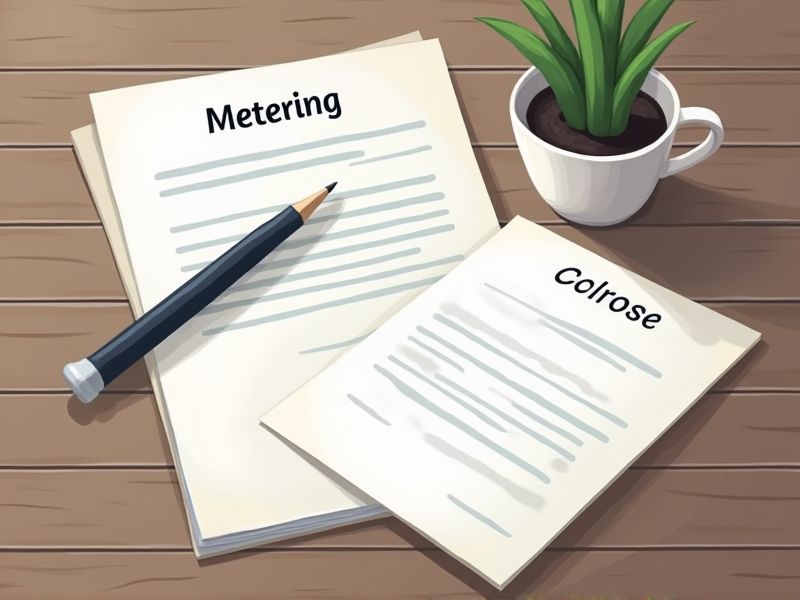
A Metering Technician's role involves dealing with complex electrical systems and equipment, necessitating specialized expertise to ensure safety and efficiency. Certifications validate a technician's skills and knowledge, demonstrating their capability to manage precise measurements and installations. They also set a professional standard, ensuring that technicians are up-to-date with industry regulations and technological advancements. Below are some crucial certifications required for a Metering Technician.
Certified Meter Technician (CMT)
Having a Certified Meter Technician (CMT) ensures accurate installation and maintenance of metering systems, reducing the risk of billing errors. CMTs are trained to handle complex metering technology, which improves operational efficiency and enhances grid reliability. With certification, technicians demonstrate proficiency and adherence to industry standards, which increases trust among utility clients. Certified technicians can quickly adapt to advancements in metering technology, supporting ongoing innovation and cost savings for utility companies.
Utility Meter Technician Certification (UMTC)
Obtaining a Utility Meter Technician Certification (UMTC) ensures that a metering technician possesses the necessary technical skills and knowledge specific to utility systems. This certification enhances accuracy and reliability in meter installations and maintenance, leading to reduced errors and downtime. Employers value UMTC as it demonstrates the technician's commitment to industry standards and professional development. Certified technicians often have access to better job opportunities and potentially higher salaries due to their verified expertise.
Electrical Metering Certification (EMC)
Electrical Metering Certification (EMC) provides metering technicians with the necessary technical skills essential for ensuring precise installation and maintenance of electrical meters. This certification guarantees adherence to industry standards, reducing the risk of faulty measurements and potential energy mismanagement. Employers often require EMC to validate a technician's competence, which directly influences customer trust in energy readings. The certification process equips technicians with up-to-date knowledge on innovations in metering technology, which enhances operational efficiency.
OSHA 10-Hour Safety Certification
Metering Technicians often encounter hazardous environments, and the OSHA 10-Hour Safety Certification provides vital training on how to navigate and manage these risks. The certification ensures that technicians understand and comply with safety regulations, which reduces workplace accidents. Proper safety training leads to fewer disruptions in operations, increasing overall efficiency. Employers also benefit from lower insurance costs when their workforce is adequately trained in safety protocols.
NFPA 70E Electrical Safety Certification
NFPA 70E Electrical Safety Certification is critical for metering technicians because it establishes guidelines to prevent workplace electrical injuries. By understanding these safety standards, technicians minimize the risk of arc flash incidents, which are a leading cause of electrical injuries. Regulatory compliance mandates alignment with NFPA standards, ensuring organizations avoid legal issues and potential fines. The certification also enhances technicians' proficiency in identifying electrical hazards, promoting a safer work environment.
Lockout/Tagout (LOTO) Certification
A metering technician often works with electrical and mechanical systems, which pose significant hazards if not properly controlled. LOTO certification ensures that technicians can safely de-energize and isolate these systems to prevent accidental start-up during maintenance. This training reduces the risk of injury or fatality by clearly defining procedures to lock and tag equipment. Compliance with LOTO protocols also aligns with regulatory safety standards, minimizing legal liabilities for employers.
Confined Space Entry Certification
Metering technicians often work in confined spaces such as underground meter pits or utility vaults, which carry potential risks like low oxygen levels and hazardous gas exposure. Confined Space Entry Certification ensures technicians are trained to recognize and mitigate these risks, thus enhancing safety. Adequate training reduces the likelihood of accidents or health issues, leading to more efficient and safer work environments. Regulatory compliance is mandatory for many utility companies, the certification helps in adhering to legal safety standards.
Calibration and Testing Certification
Calibration and Testing Certification ensures that a metering technician's instruments provide accurate measurements, essential for maintaining integrity in data collection. Accurate measurements reduce discrepancies in billing and compliance with legal regulations, avoiding potential financial and legal repercussions. Proper certification updates technicians on the latest standards and technologies, enhancing their effectiveness and operational efficiency. Certification also establishes professional credibility, fostering trust with clients and employers.
Basic Electrical Theory Certification
A Basic Electrical Theory Certification ensures a metering technician understands fundamental electrical principles, which are crucial for safely and accurately working with electrical systems. This certification provides a foundational knowledge that aids in diagnosing and troubleshooting electrical issues, thus minimizing errors and equipment downtime. Employers often require this certification to verify that their technicians possess standardized industry knowledge and skills. It also enhances a technician's credibility and employability in the competitive job market within the utility sector.
Instrumentation Field Technician Certification
Instrumentation Field Technician Certification is crucial for metering technicians because it ensures a standardized knowledge of measurement principles and safety protocols, minimizing operational errors. Certification demonstrates proficiency in the latest industry technologies, enhancing the reliability and accuracy of instrumentation systems. Employers often require certification as it verifies a technician's capability to handle complex metering equipment, reducing the risk of costly downtime. Certification also aligns with industry standards, fostering trust and compliance in regulatory environments.
Summary
When you earn certifications as a Metering Technician, your competence and industry recognition typically increase. Employers often view certified technicians as more reliable, potentially offering you more job opportunities and higher compensation. Certified technicians usually maintain higher accuracy in meter readings and installations, improving operational efficiency. You might also experience greater job satisfaction and career progression due to enhanced skills and qualifications.
